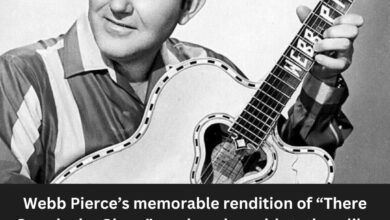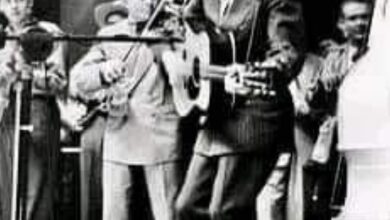Kris Kristofferson’s “Help Me Make It Through the Night” Redefines Vulnerability in Country Music 1970
In 1970, Kris Kristofferson released “Help Me Make It Through the Night,” a song that would come to define not just his career but the emotional core of modern country music. Though it was Sammi Smith’s 1971 cover that took the song to No. 1 on the country charts and crossed over to the Billboard Hot 100 Top 10, it was Kristofferson’s raw, poetic writing that broke the mold. With lyrics that dared to confront loneliness and longing in a deeply personal way, the track ushered in a new kind of intimacy in songwriting.
Kristofferson, a former Rhodes Scholar and Army helicopter pilot, had taken a dramatic leap in the late 1960s by abandoning a secure military career to pursue songwriting in Nashville. At the time, the industry favored polished compositions and traditional storytelling, but Kristofferson’s poetic realism and lived experience gave his songs a sense of gravity. His gravelly voice and weary delivery added weight to his lyrical honesty, setting him apart in a city full of smooth-voiced crooners.
The inspiration for “Help Me Make It Through the Night” came from a casual remark made by country legend Frank Sinatra. Sinatra was once quoted as saying he embraced life’s indulgences because he didn’t want to face the night alone. Kristofferson, struck by the loneliness embedded in that sentiment, wrote a song that confronted the need for human connection—without pretense or apology. The result was a confessional plea that challenged the era’s conservative values with quiet defiance.
The original recording, which appeared on Kristofferson’s debut album Kristofferson in 1970, featured sparse instrumentation and an understated vocal. The production—guided by Fred Foster at Monument Records—allowed the lyrics to take center stage. Kristofferson’s hushed, almost spoken delivery was a stark departure from the bravado typical of male country singers of the day, making the song’s emotional honesty even more pronounced.
When Sammi Smith recorded the song later that year, her soulful interpretation and richer vocal tones brought Kristofferson’s lyrics to life in a way that resonated with mainstream audiences. Her version stayed on the country charts for 20 weeks and won the 1972 Grammy Award for Best Female Country Vocal Performance. It also reached No. 8 on the Billboard Hot 100, making it one of the first modern country songs to cross over into pop success.
The song’s candid take on intimacy and vulnerability marked a turning point in country music. It challenged traditional gender roles and expectations, especially for male songwriters and performers. Instead of stoic resolve or macho declarations, here was a man openly asking for comfort—and doing so without shame. It wasn’t just provocative; it was revolutionary.
Following the song’s rise to fame, Kristofferson’s career experienced a meteoric ascent. He became a sought-after songwriter, with artists like Janis Joplin (“Me and Bobby McGee”) and Johnny Cash (“Sunday Mornin’ Comin’ Down”) embracing his deeply human storytelling. “Help Me Make It Through the Night” gave him not only a signature hit but also a platform from which to challenge the narrative boundaries of the genre.
The song’s impact extended far beyond Kristofferson’s own career. It inspired a wave of country music that embraced lyrical vulnerability and blurred the lines between country, folk, and pop. Artists like Willie Nelson, Emmylou Harris, and even Waylon Jennings would follow the trail Kristofferson blazed, embracing personal reflection and poetic realism in their work.
Dozens of artists have since covered “Help Me Make It Through the Night,” including Elvis Presley, Joan Baez, Willie Nelson, and Gladys Knight. Each rendition brings a different tone—whether it’s Elvis’s brooding sensuality or Baez’s fragile yearning—but all retain the emotional weight that made the song timeless. These covers speak to the universality of the song’s themes: loneliness, desire, and the search for solace.
Around the time of the song’s release, Kristofferson was transitioning into film work, landing acting roles that mirrored his rugged, introspective image. His multifaceted career—as actor, singer, and songwriter—reflected the depth and complexity he brought to “Help Me Make It Through the Night.” The song wasn’t just a hit; it was a snapshot of a man and a moment, caught in quiet desperation.
Over the decades, “Help Me Make It Through the Night” has remained a staple on radio playlists and in country music retrospectives. Its lyrics, once considered controversial for their openness, are now regarded as some of the most poignant in American songwriting. The song has been inducted into the Grammy Hall of Fame, a testament to its lasting influence.
Its legacy also lies in how it reshaped the songwriting landscape. Kristofferson made it acceptable—even admirable—for men in country music to be emotionally transparent. His influence paved the way for generations of artists to explore themes of fragility, need, and emotional honesty without sacrificing masculinity.
Later in his career, Kristofferson would receive numerous accolades, including induction into the Country Music Hall of Fame and a Grammy Lifetime Achievement Award. “Help Me Make It Through the Night” is consistently cited as one of his most important and enduring works—both artistically and culturally.
In reflecting on why the song endures, it’s clear that its power lies in its simplicity and sincerity. It doesn’t hide behind metaphor or grand gestures; it just asks for someone to stay, if only for a night. In doing so, it speaks to something universal in all of us—the quiet moments when strength gives way to need.
Ultimately, “Help Me Make It Through the Night” stands as one of the most emotionally resonant songs in country music history. Kris Kristofferson didn’t just write a hit; he created a new language for vulnerability in song—a legacy that still echoes in every ballad that dares to speak plainly from the heart.



